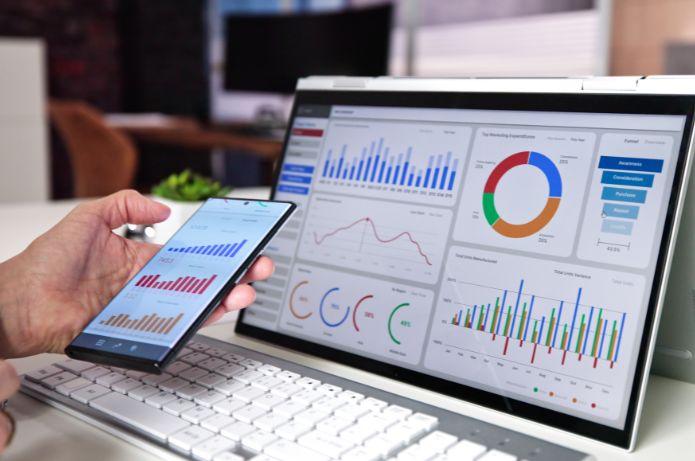The Brazilian Internet of Things Association (ABINC) and the International Data Spaces Association (IDSA) highlighted during a panel at Futurecom 2024, the relevance of Data Spaces as pillars for the advancement of the new data economy in Brazil. The panel, moderated by Flavio Maeda, vice president of ABINC, brought together leading experts, including Sonia Jimenez, director of IDSA; Isabela Gaya, Innovation manager of the Brazilian Industrial Development Agency (ABDI); Marcos Pinto, director of the Competitiveness and Innovation Department of the Ministry of Development, Industry, Industry, Innovation and Services (MDIC)
During the event, Sonia Jimenez stressed that many companies still face barriers to maximize the value generated by the data they collect, mainly due to the lack of trust in sharing information.“ companies generate a lot of data, but are not getting the expected return. IDSA emerges as a solution to promote trust between the parties involved in the secure sharing of data, helping to overcome technological barriers and generating concrete benefits for the” business, Sonia said.
She also highlighted that the landscape is changing, and organizations are beginning to realize the clear benefits of an integrated data economy. Sonia explained that IDSA is seeing a growing awareness of the value of Data Spaces, especially in promoting technological innovations and interoperability of systems. According to her, this not only increases efficiency, but also helps reduce costs and foster new digital business models.
Another highlight of the panel was the unprecedented research of ABDI “Agro Data Space Agro 4.0” Program, presented by Isabela Gaya, which explored the potential of Data Spaces in agribusiness, a sector crucial to the Brazilian economy. The study indicated that the adoption of Data Spaces could generate an increase of 30% in operational efficiency in different areas of agriculture and reduce costs by 20%.In addition, the use of advanced technological solutions, such as the Internet of Things (IoT) and artificial intelligence, would enable the collection and analysis of large volumes of data, allowing more informed decisions and agile in the field.
The research also highlighted the positive impact on sustainability. For example, producers could reduce by up to 70% the use of herbicides and significantly reduce the use of other inputs through monitoring and automation technologies, which would result in more sustainable and efficient production. The study also revealed that more than 1 million rural properties could directly benefit from this digital transformation, which reinforces the strategic role of Data Spaces in strengthening the competitiveness of the Brazilian agroindustrial sector.
Isabela Gaya, from ABDI, commented during the event on the impact of digitization on the agricultural sector: “The adoption of innovative technologies integrated with Data Spaces can transform Brazilian agribusiness, improving productive efficiency and promoting a more sustainable management of” resources. She emphasized that the sector is ready to embrace these innovations, especially with the support of public policies and targeted investments.
Marcos Pinto, director of the Department of Competitiveness and Innovation of MDIC, brought the government's perspective on the importance of accelerating the development of Data Spaces in Brazil.He highlighted that the country has a massive production of data, both from people and companies, but that only 25% of large corporations are using data analytics effectively. “The government wants to stimulate the development of these Data Spaces to accelerate the data economy in Brazil.We are creating a specific program for this and studying sectors where this technology can be successfully applied, as we have already seen in other countries”, explained Marcos.
He also mentioned that the government is in the articulation phase, talking to various sectors to identify areas in which Data Spaces can be implemented.“Our message is collaboratively built, and we hope to launch by the end of the year concrete measures to support this development.We have studied initiatives from other countries, especially the European Union, and we do not want to wait five years to take advantage of this wave of innovation.The advantage is to create market opportunities and develop competitive products”, Marcos. According to him, the government should promote a subsidy making for a regulatory legal framework soon.
The MDIC director emphasized that Brazil is committed to supporting the productive sector in the transition to a more digital and efficient economy.“To achieve productivity gains, we will need digital companies that can develop these solutions.The government wants to be side by side with the productive sector to ensure that this happens”, he concluded.
ABINC, in partnership with IDSA, has been working to bring this concept of Data Spaces to Brazil, seeking to leverage the country's digital competitiveness. These initiatives are part of a larger effort of digital transformation, which aims to integrate sectors such as agriculture, health and mobility, as well as fostering the creation of new business opportunities.
Flavio Maeda, vice president of ABINC, stressed that this partnership with IDSA consists of bringing knowledge to the market about the potential of Data Spaces in Brazil, especially for agribusiness and industry. Maeda also explained that ABINC is working together with IDSA, ABDI, CNI and MDIC to implement, in 2025, the Open Industry project, similar to what Open Finance was. “We want to bring the same benefits of Open Finance to other industrial sectors. This project also meets the concept of Data Spaces”, Maeda.
Rodrigo Pastl Pontes, from CNI, also commented on the importance of a robust and interoperable infrastructure so that industrial companies can share data safely and reliably, driving innovation and efficiency in various sectors.
With the advances discussed at Futurecom 2024, it is clear that the data economy will play a central role in the future of Brazil, and the concept of Data Spaces will be fundamental to consolidate this path, as concluded Sonia Jimenez: “The evolution of Data Spaces will allow Brazilian companies to reach a new level of innovation, with security, transparency and, above all, confidence in data sharing”.










